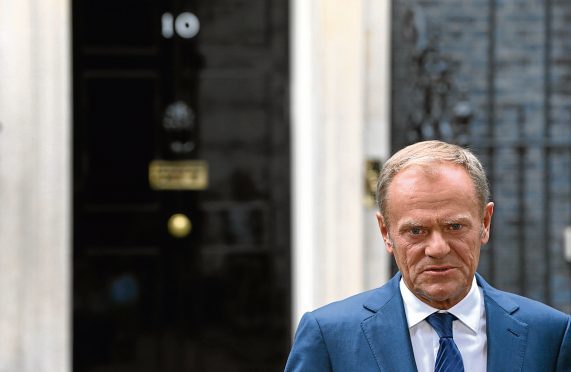Sir, – European Council president Donald Tusk says Britain can still change its mind and abandon Brexit (October 25).
The European Union is in turmoil and desperate.
Voters across Europe are rejecting everything Brussels stands for.
Austria is poised for a coalition government with an anti-immigration policy.
Scandinavia, the Netherlands, France, Germany, Poland, Hungary and the Czech Republic all are demanding that immigration is halted.
Catalonia is now a festering sore to Spain.
Italy’s anti-establishment Five Star movement is the country’s most popular party and it wants to ditch the euro while two of Italy’s richest regions, Lombardy and Veneto, want greater autonomy from Rome.
The UK is the second-highest net contributor to the EU, at £8.6 billion, so one can see why the EU mandarins are anxious that we stay.
After all, their salaries, pensions and bloated lifestyles are at risk.
France, third on the list, pays only half of Britain’s contribution.
Only 12 countries contribute, with Cyprus lowest at 0.02 billion euros.
The other 16 take, with Poland the highest, receiving 9.48 billion euros.
It is time to escape from this unaccountable, corrupt, undemocratic and mega-expensive dictatorship.
Clark Cross.
138 Springfield Road,
Linlithgow.
Money better spent on roads
Sir, – I read with incredulity that Perth and Kinross Council is to spend many millions of pounds on the city of light illuminations (October 24).
No doubt the effect will be gorgeous (it had better be at those prices) but the money would be better spent on the shocking state of the roads and, in particular, pavements and on grant-aiding the smartening up of many shop and residential facades in the city centre which make a mockery of the aspiration to be a city of culture.
Then we could be proud of Perth in daylight, too.
David Roche.
6 Conachar Court,
Isla Road,
Perth.
Smacking does not help children
Sir, – What a lot of predictable rubbish is being spouted on your letters page regarding the Scottish Government’s proposed ban on smacking.
There was a claim that an absence of smacking leads to children growing up to be ill-mannered and loutish thugs and that it undermines… the family unit.
Is there evidence for this?
Children have been smacked since time immemorial, yet there is no shortage of thugs, and the family unit has been said to be in crisis long before there was any mention of a smacking ban.
I would propose that there is much more evidence in the world around us to indicate that hitting children, and that is what the euphemism “smacking” means, teaches them that might is right, and that the way to resolve problems is by using violence.
Les Mackay.
5 Carmichael Gardens,
Dundee.
Light clothes are safer for cyclists
Sir, – Last week I wrote a letter voicing my concern about cyclists wearing dark clothing that does not stand out well, especially in dull conditions.
I quoted the Highway Code with its recommendation for cyclists to wear light-coloured clothing.
Your correspondent Peter Clinch then accused me of cherry-picking from the Highway Code.
I did not do so and I certainly was not laying down the law in any way.
He made the irrational statement that it is ironic that people complain of the “invisible” cyclists they have just seen.
My concern was for the “invisible” cyclists who end up in hospital or worse.
Unlike Mr Clinch, I tend to ignore statistical “evidence” and rely on common sense.
I am sure that not many “visible” cyclists are injured and killed compared to the vast number of cyclists who are hit by drivers who didn’t see them.
At the end of the day, it is obvious that a cyclist wearing light clothing stands out better than someone wearing dark clothing.
Harry Key.
20 Mid Street,
Largoward.
Wrong to treat IS as criminals
Sir, – The horror expressed by many at Rory Stewart MP’s comment that the only way of dealing with British Islamic State fighters in Syria will be “in almost every case, to kill them” reveals a complete lack of under- standing of the nature of self-styled Islamic State and the war in which it is engaged.
When an ideological movement is utterly defeated, as the Nazis were in 1945, it becomes possible to treat them as mere criminals.
Similarly, where a terrorist movement such as the IRA or ETA has a limited objective and limited territorial scope, it can be treated as a criminal problem.
By contrast, Islamic State is part of a global Sunni Islamist movement.
The fall of Raqqa and the likely retaking of all the territory held by IS are only a setbacks.
In essence, progressive opinion is asking us to treat the brutal soldiers of an undefeated enemy in foreign lands as criminal suspects.
This is clearly absurd – they are still at war with us.
The desire to treat IS fighters as merely criminals is just the latest expression of the pacifism so rightly criticised by George Orwell during the Second World War. He pointed out that a pacifist who undermines the fight against evil is contributing to their victory.
Otto Inglis.
6 Inveralmond Grove,
Edinburgh.
